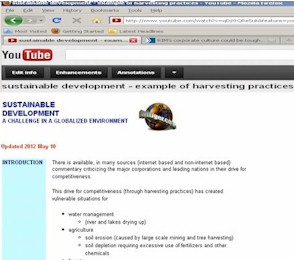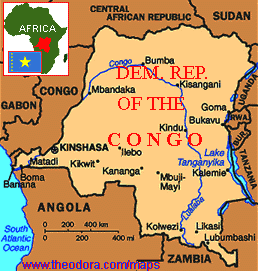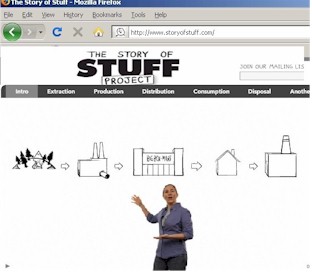DEVELOPMENT
A CHALLENGE IN A GLOBALIZED ENVIRONMENT

| SUSTAINABLE
DEVELOPMENT A CHALLENGE IN A GLOBALIZED ENVIRONMENT |
 |
Updated
2021 June 16
| INTRODUCTION | b | There is available,
in many sources (internet based and non-internet based) commentary criticizing
the major corporations and leading nations in their drive for competitiveness.
This drive for competitiveness (through harvesting practices) has created vulnerable situations for
WTGR |
| INTRODUCTION
Harvesting practices |
 b b |
Discussion (May
10th 2012) about the meaning of the phrase
"harvesting practices" http://youtu.be/qDjXtQRe5uk |
| a Definition | b | "'Sustainable
development is
development that meets the needs of the present without compromising the ability of future generations to meet their own needs." these exact words come from
an Australian website
WTGR |
| Globalization
and Sustainable Development
|
you may find it interesting
to read
link was http://www.icsea.or.id/sea-span/0998/RG1020LL.htm "Is Globalization Undermining the Prospects for Sustainable Development? " by Martin Khor - written 10 years ago in 1997 !! "The ecological crises
that threaten the survival of Earth continue to unfold at breakneck speed
under the influence of commercial interests, driven even further by
the competitive pressures of globalization. At the same time, the globalization
process pits company against company, country against country and individuals
against one another.... five years after Rio Summit, the process of globalization
linked to liberalization has gained so much force that it has undermined
and is undermining the sustainable development agenda. Commerce
"The major reason is that in the five years after Rio, [1992] the process of globalization linked to liberalization has gained so much force that it has undermined and is undermining the sustainable development agenda. Commerce and the perceived need to remain competitive in a globalizing market and to pamper and cater to the demands of companies and the rich have become the top priorities of governments in the North and some in the South" |

pic supplied by Stephanie
|
Student Stephanie
F. in MGTC46 at UTSC in 3rd week of January 2011, emailed to say
I was doing some reading before your class on sustainable development and in that section of the website, you mostly talked about illegal deforestation, or exacerbating the natural resources that mother nature has given us for mere profit. However, something that hits closer to home, is in regards to the expansion of highways in Toronto. Usually when building highways, it includes mass deforestation and disturbances to natural ravines, estuaries and water reserves that are really damaging to the ecosystem. Most people feel that highway infrastructure expansion is necessary for "development" I believe that the city should be looking towards other alternatives such as increase buses (which takes about 30-60 cars off the roads, minimizing emissions) rather than building more highways to try to lower travel and idling times during traffic hours. Most people may think that highways are necessary for agricultural health or global development (because of transportation) and therefore improving businesses. In a ways, yes it does improve transportation costs to have a more efficient and most direct route available. But also to consider, highways normally lead to big-box stores, malls and large shopping centers. These places of retail are normally foreign-owned stores and does nothing for local businesses. In fact, one can even argue that because of new highways, smaller family owned businesses are suffering as a result. Thus, I think that the best option in terms of transportation for global developed economies is to lower the usage of cars, and increase the efficiency of transit systems so more people will use it. Giving nature, forest and natural bodies of water, a chance to sustain the animals and creatures living inside it.
|
| Indonesia
Sustainability |
"Indonesia's
forests are being destroyed faster than any on Earth. A forest area the
size of six football fields disappears every minute, In total, Indonesia
has already lost more than 72% of its large intact ancient forest areas
and 40% of its forests have been completely destroyed."
posted on www.asiafinest.com
2007 April
|

photo by WTGR, Pefferlaw
Creek, near Udora
| Sustainability
Water
|
In 3rd week
of January, 2011, student Lynne G. in MRK 460 at Seneca sent a fairly detailed
and informative email commenting on "what some Canadian companies are doing
to conserve or curb their consumption"
Lynne wrote
They claim that under their new Oil Sands Water Management Plan, "All of our wastewater will either be recycled in our operations or cleaned up and safely returned to the river. This, in turn, will reduce our reliance on fresh water and should allow us to live within our current water license allocations, even as oil sands production rates continue to grow."" http://sustainability.suncor.com/2010/en/responsible/1809.aspx Lynne added "I
am not certain if Suncor's Water Management Plan is entirely driven by
regulatory restrictions, but the company appears to have recently (2010)
incorporated an Environmental Excellence Strategy into their annual operations
planning, in order to align corporate goals with environmental initiatives.
Two major parts of the plan involve water management and development of
new technologies to help reduce the solidification time of tailing ponds.
"
WTGR replies
|

| Sustainability
Farming
|
In 3rd week
of January, 2011, student Yuliya F. in MRK 460 at Seneca sent an interesting
email about how the fires in Greece in 2010 are related to converting the
land from designated farm land to housing
Yuliya wrote
http://www.economist.com/node/9718557?story_id=9718557&top_story=1
Another article on Greece fire in July 2010 "Wildfires are an ever recurring
nightmare for Greece, which has to deal with the issue every summer. Whether
they are sparked accidentally or by arsonists who want to clear land for
development, wildfires cause severe economical damage every year and have
caused casualties in the past."
WTGR replies
|
 |
Mining for large amounts
of cobalt - a metal used in making cell phones and other high tech devices,
has caused extreme damage to the environment in centra Africa and effected
thousands of lives.
There are many articles in newspapers and magazines, online and offline that explain the effect of unsustainable mining on the jungle and how the conflict has resulted in many Africans being killed by violence, or poisoned by pollution from the mining of cobalt. WTGR |
| Madelaine Drohan www.madelainedrohan.com
wrote an article in The Star 2004 Nov 21 about the environmental consequences of the cobalt mining in the Congo. |
| "Poisoned water, poisoned
air"
"Congo is in the grip of a massive, unregulated cobalt rush. Demand from China, in particular, has quadrupled the price of cobalt in the last year, prompting anyone able to wield a pick and shovel to join in the frenzy. In a country still devastated by war, there are few other ways to earn a living. So, dressed in T-shirts, shorts and flip-flops, an estimated 60,000 people go out each day to mine the fabled riches of the Congo by hand. ...In their desperation, they go wherever they think they can find cobalt, even if that means digging the radioactive soil at Shinkolobwe, where it is found in combination with uranium. An estimated 7,000 miners work at the mine. In its recent report, Rush And Ruin: The Devastating Mineral Trade In Southern Katanga DRC, the London-based activist group Global Witness said the cobalt trade is ruining the Congo's economy and environment, and the livelihoods of its people....It is not just the miners who are in danger. Transporting radioactive cobalt ore in open trucks spreads the dust along the roadside..." journalist Madelaine Drohan is the author of Making A Killing: How Corporations Use Armed Force To Do Business. Madelaine Drohan emailed
Richardson Nov 23rd 2004 to say "...I'm really pleased you found the article
useful and I'd be happy if you shared it with your students...."
|
| What
is cobalt
What
is cobalt
|
"Cobalt is a brittle, hard,
transition metal with magnetic properties similar to those of iron."
http://www.webelements.com/webelements/elements/text/Co/key.html "Cobalt is a naturally occurring
element found in rocks, soil, water, plants, and animals. Cobalt is used
to produce alloys used in the manufacture of aircraft engines, magnets,
grinding and cutting tools, artificial hip and knee joints. Cobalt compounds
are also used to color glass, ceramics and paints, and used as a drier
for porcelain enamel and paints."
"high cobalt prices, caused
predominantly by China’s huge demand for the metal for use in mobile phone
batteries"
"most of the world reserves
lie in Congo"
commentary on the violence
and war in the Congo region as a consequence of the competition for access
to mining Colbalt
" It is a key component in
the batteries developed for new fuel-saving hybrid cars such as the Toyota
Prius and Honda Civic...The Cobalt Development Institute in the United
Kingdom estimates that global demand for cobalt, which was 43,000 tonnes
in 2003, will soar to 130,000 tonnes by 2020."
|
| Todd
Pitman
ASSOCIATED PRESS Congo ban doesn't end work at old uranium mine site Pitman wrote a story in June 2004, which was widely carried in many newspapers, about the old uranium mines in the Congo that are being exploited by people trying to sell to international buyers |
Pitman writes
"Business is booming in the mining zone that supplied uranium for the atomic
bombs unleashed on Hiroshima and Nagasaki – despite a decree by Congo's
president banning all mining activity here.
President Joseph Kabila ordered the zone closed three months ago amid growing concerns that unregulated nuclear materials could get into the hands of so-called rogue nations or terrorist groups. Yet 1,000 miles away from the capital, Kinshasa, thousands of diggers are still hacking away at a dark cavity of open earth in this southeastern village, filling thousands of burlap sacks a day with black soil rich in cobalt, copper – and radioactive uranium." |
| Pitman says "The illegal
mining provides stark evidence of how little control Africa's third-largest
nation has over its own nuclear resources, highlighting the government's
lack of authority beyond the capital in the aftermath of Congo's devastating
1998-2002 war.
"They're digging as fast as they can dig, and everyone is buying it," John Skinner, a mining engineer in the nearby town of Likasi, said of the illegal freelance mining at Shinkolobwe. "The problem is that nobody knows where it's all going. There is no control." |
 |
Student Tushar
C. in MGTC46 in Jan 2011 at UTSC sent an email in which he noted finding
a useful video talking about how things are made - which, if you understand
this, can help you understand the background to globalization and the pressures
in sustain able development.
Tushar wrote
I was on your website doing some reading on the sustainable development topic and remembered an interesting video that I watched in my elective course "Environmental Conservation and Sustainable Development". The video is called The Story of Stuff storyofstuff.comand provides a clever and in-depth overview of the consumerist society and how it effects the environment, while making relationships to sustainable development. |
| Stuff | Tushar continues
There is different chapters and it is 20 minutes in length, so if you get a chance, please check it out because I think it would add a strong media element that you might be able to encorporate to the unit if you'd like. When watching this video last semester, it definately helped me understand the overall picture and this understanding might help facilitate other students as well in their understanding of how businesses can either take advantage or lose a competitive advantage in the future. " WTGR replies
|
 |
nnnnnnnnnn
|
- this
means other professors and teachers and students can use my stuff for teaching
and learning without having to ask first
-
it would be nice if you identified me as the source, just refer to witiger.com